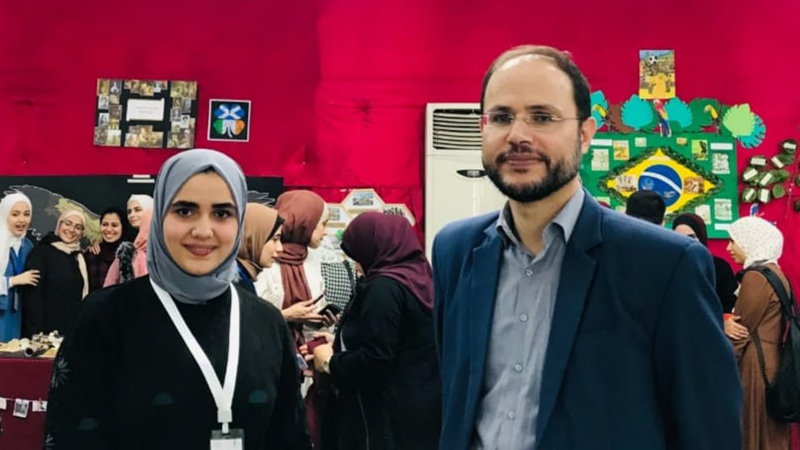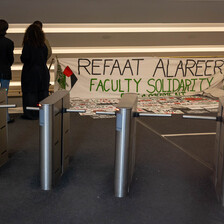The Electronic Intifada 28 April 2024

Hend Ghazi Alfarra with Refaat Alareer. (Photo courtesy of Hend Ghazi Alfarra)
I hold my pen once again.
Writing is harder this time. This time I am writing about our beloved Dr. Refaat Alareer.
As Dr. Refaat helped me develop my writing skills, it is only appropriate that I should tell the world about him.
Dr. Refaat believed that writing can create magic. He said that writing can give you immortality.
And because I trusted him and believed what he said, I also believe in the power of writing.
I first got to know Dr. Refaat at a training course. The course was meant for seniors and graduates, and since I was only a freshman when I applied, it seemed that I had little to no hope of being accepted.
Luckily, Dr Refaat was the one who was interviewing candidates. I entered the room that day and introduced myself.
I expected him to tell me that I was too young for such an opportunity and that I wouldn’t be able to work at such an age.
To my surprise, he was really happy when he learned I was thinking of working while studying. He encouraged me and told me that despite being a freshman I scored really high in the test for the training course.
He encouraged me to prove my skills and changed the way I think of my abilities. He was the first to recognize my talent.
He would tell my older colleagues that I was younger than them yet had similar talent.
“Proud of you”
Whenever I doubted that I could do a certain job, I ran to him and asked for advice. He would assure me that I could always approach him seeking help.
When I got my first online job, I sent him a text message. “Proud of you,” he replied.
He treated his students as friends and would never belittle their achievements.
Whenever I expressed amazement at his writing, he would reply that we can all do similar or better things if we focus.
When Israel declared its current war on Gaza, he urged us to start writing. Our voices needed to be heard around the globe, he told us.
I had never written articles for publication previously. But I decided I would try.
I took up my pen and found that I was writing without being conscious of doing so. I had seen so much and wanted the world to learn about what was going on in Gaza.
When I had finished writing an article, I sent Dr. Refaat a text message. He replied within minutes.
He would always reply quickly. He was always available even in times of war.
That was a week before the brief truce in November. At that time, Israel was concentrating much of its violence on the area where Dr. Refaat was taking shelter.
I didn’t have to say much. He took care of everything else and in a matter of days my first article was published.
Identity crisis
Being born and raised outside Palestine forced me to face an identity crisis.
I had always felt like I didn’t belong to a certain place. In Gaza many people treated me as an outsider.
I really needed someone to remind me of what it means to be a Palestinian and how being a Gazan can be a blessing.
Dr. Refaat was that person for me.
He was the one who planted Palestine in us.
A Palestine that would never be occupied.
A Palestine that will forever stand up proud.
I never got to tell him that.
Whenever I was worried about Dr. Refaat in the early stages of this war, I would send him a text message. He answered every time, except the day when my message didn’t reach him.
I waited for two days and kept on fooling myself that he hadn’t received the message simply because he couldn’t find a phone signal.
One morning in December, I woke up to see numerous photographs of Dr. Refaat on the internet.
The news was terrible: Israel had assassinated him.
Dr. Refaat was precious to all Palestinians around the world. Even if they didn’t know him personally, he made a difference to their lives.
He fought so that they could have a better future.
As I read through the accounts of people who knew Dr. Refaat, I learnt that he will live forever through his work, that he will be remembered when this horrible war comes to an end.
He will be remembered as a great man, a man with ambitions and principles.
He will be remembered for standing up to the cowardly Israelis, for exposing their lies.
Now – several months after Dr. Refaat’s assassination – we have received the news that Israel has killed his daughter Shymaa, her husband Muhammad and their newborn baby Abd al-Rahman.
I first encountered Shymaa through Asma, our mutual friend. I had been talking to Asma when Shymaa came up to her from behind and hugged her.
Shymaa had bought some candies for her little sister and wanted to give Asma some of them.
I just stood there in silence the whole time. I was thinking of how much Shymaa resembled her dad Dr. Refaat.
Shymaa had to leave because Dr. Refaat was waiting for her in the car.
The next day, Asma told me that Shymaa felt guilty as she hadn’t said “hi” to me. She wanted Asma to apologize for that.
I laughed and thought Shymaa was really sweet. I was the one who had stood aside so that I could give Shymaa and Asma a moment to talk in private.
Yet Shymaa insisted on apologizing as she didn’t want me to feel unwelcome.
I can only imagine what it was like for Shymaa to give birth in the conditions which she did.
First, she had to bear the pain of losing her dad. And then she had to give birth without medical supervision.
After Abd al-Rahman was born, Shymaa wrote a social media post addressed to her late dad. “Do you know you have become a grandfather now?” she asked.
Dr. Refaat never got to see his grandson.
The news that Shymaa, Muhammad and Abd al-Rahman have been killed is heartbreaking.
But I take some comfort in knowing that Dr. Refaat and Shymaa have been reunited in a place where there is justice and peace.
Dr. Refaat can see his child again.
And Shymaa can see hers.
Hend Ghazi Alfarra is a writer and English literature student in Gaza.



